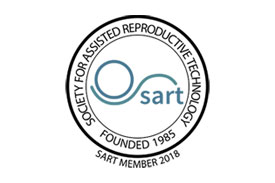During conventional in-vitro fertilization (IVF), eggs are retrieved, fertilized, and kept in the incubator in the lab for few days. The last step in the process is the embryo transfer, also known as “fresh” embryo transfer when the embryo (fertilized egg) is placed in a woman’s uterus.
At times, the fresh embryo transfer does not occur. Therefore, all the embryos resulting from the IVF cycle are frozen for a future transfer; or there can be excess embryos remaining after the fresh transfer that are frozen for a future attempt.
In these instances, the treatment using frozen embryos is called frozen embryo transfer (FET). A frozen embryo transfer cycle can be planned as soon as a month after the embryos were created or several years later.
Our fertility and laboratory experts use the most advanced method of cryopreservation called vitrification, whereby embryos are frozen very quickly. This avoids the formation of ice crystals that could damage the embryos.
Many couples and patients have had successful pregnancies and live births using this method — indeed, pregnancy success rates for FET cycles are comparable to conventional IVF cycles. Our fertility specialists can help you discover which transfer is best for you.
Who is a Candidate?
Frozen embryo transfers are common.
You may choose a frozen embryo transfer or be encouraged by your IVF specialist to consider it if:
- You have leftover embryos from a fresh cycle (one of the most common reasons for a frozen embryo transfer). You can use the extra embryos that have been previously created.
- Pre-implantation genetic testing (PGT). Couples who decide to have genetic testing performed on the embryos need to freeze them while waiting for test results.
- Medical reasons. If there is a medical problem — such as ovarian hyperstimulation syndrome (OHSS) or an issue with the endometrium, such as a polyp or a thin endometrium, or if you have a premature rise in the level of progesterone before egg retrieval — your doctor may recommend FET and reschedule the transfer for a better time.
- You are undergoing fertility preservation before cancer treatments. You may decide to freeze embryos before undergoing chemotherapy or radiotherapy in these instances.
- You are using gestational surrogacy.
- You are using donor eggs to better plan the embryo transfer.
What to Expect
Your doctor will perform a frozen embryo transfer when your body is optimally prepared for pregnancy. This quick, painless procedure is done in your doctor’s office and does not require anesthesia. Your doctor will let you know when you have a follow-up pregnancy test.
Why Choose UHealth?
A comprehensive approach to fertility. Our closely-knit team of experienced professionals – including female and male fertility specialists, acupuncturists, and physicians with special expertise in polycystic ovarian syndrome (PCOS), thyroid disorders, endometriosis, and hormonal imbalances – work together to ensure the health of you and your baby.
High pregnancy rates. We have some of the highest pregnancy rates in not only South Florida, but in the entire United States. Our success stories include even the most challenging cases.
Personalized attention to help you take control of your health. Faculty members at the Miller School of Medicine, a nationally recognized institution, currently conduct nearly 2,000 research projects in science and clinical care in a variety of fields. Our emphasis on research and innovation ensures you receive the most sophisticated diagnostic tests and advanced fertility treatments available.
Questions? We're here to help.
Our appointment specialists are ready to help you find what you need. Contact us today.

